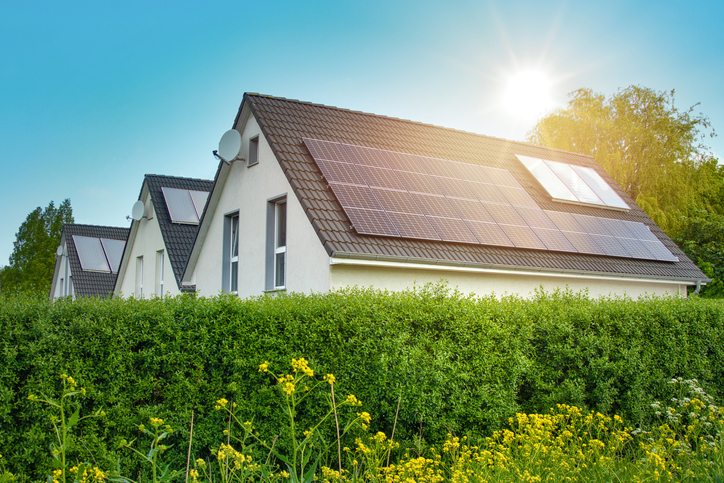6.26.23
Home Solar Panels: Are They Worth It?

Residential solar systems are more affordable than ever with reduced prices and tax breaks.
The promise of lower electricity bills, a smaller carbon footprint and tax breaks have many homeowners wondering if it’s worthwhile to install solar panels. Here’s the information you need to determine if your home could be a good candidate for a solar power system.
Upfront costs for solar are significant—but maybe not as high as you think
Nationally, the average cost of a residential solar system is $25,000 before incentives.
While that’s still a significant price tag, it’s about half the cost from 10 years ago, according to Solar Energy Industries Association. In Michigan, our costs are a bit lower than the national average; most home solar systems here run between $15,000 – $20,000, Energy Sage reports.
The overall cost of solar can be lowered even further by tax credits included in the federal Inflation Reduction Act (IRA). The amount credited on a homeowner’s income tax return is determined by the cost of the system. Here’s how it works:
In August 2022, Congress passed an extension of the Investment Tax Credit raising it to 30% for the installation of which was between 2022-2032 … It will decrease to 26% for systems installed in 2033 and to 22% for systems installed in 2034. The tax credit expires starting in 2035 unless Congress renews it.
There is no maximum amount that can be claimed. (Source: Energy.gov)
With the federal incentive, a $20,000 system installed in 2023 would net a tax credit of $5,200, bringing the overall cost of installing solar down to $14,800.
Do solar panels save money?
The Energy Sage calculator shows that the payback period for most homeowners in southwest Michigan ranges from 8.7 years to 13 years. And, homeowners in our region with solar panels see their monthly electricity bill reduced between 70-103%.
Non-financial reasons to install solar panels
For some homeowners, the decision to go solar goes beyond finances. Many like the fact that they have access to off-grid power in the event of an outage. Solar is reliable. Others choose solar because it’s a clean and renewable source of energy. Overall. using solar reduces their carbon footprint.
Take location into account
Michigan may not be the sunniest state, but even cloudy days provide indirect light that can help power your home.
Home characteristics, such as the direction the roof faces and shade coverage from trees affect how much sunlight individual homes receive. Google’s Project Sunroof provides specifics for many addresses, including the hours of usable sunlight per year. It also shows how many square feet are available for solar panels based on 3D modeling of your roof and nearby trees.
What condition is your roof in?
Your roof needs to be in good condition before installing a solar system. The guideline from Owens Corning is that asphalt shingle roofs should be no more than 10 years old. This is wise counsel because you don’t want to incur the cost of removing solar components later to repair or upgrade the roof and then re-install the solar system.
Other places to mount solar panels
The first choice for most homeowners is to mount solar panels on their home’s roof. However, it’s not the only suitable place. The roofs of standalone garages, sheds, barns and carports also work.
Vertical installation is possible for residential solar panels but will cost more than a horizontal orientation. The higher price is because vertical systems require specialized support systems.
If you’re in an HOA, check the rules
Some states grant homeowners solar rights by law; Michigan isn’t one of them. If you are part of an homeowners association (HOA), check the rules and regulations to see if solar panels are allowed or if there are restrictions on how they can be installed.
Financing solar panels
If you have enough cash on-hand to install a solar panel, you’ll start reaping maximum savings right away. Homeowners who prefer to finance a solar system can use either a home equity loan or personal loan. Both loan options allow you get a solar system and start saving on monthly utility bills now while paying for the system over time.
*All loans subject to approval. Rates, terms, and conditions are subject to change and may vary based on credit worthiness, qualifications, and collateral conditions.
![]()



